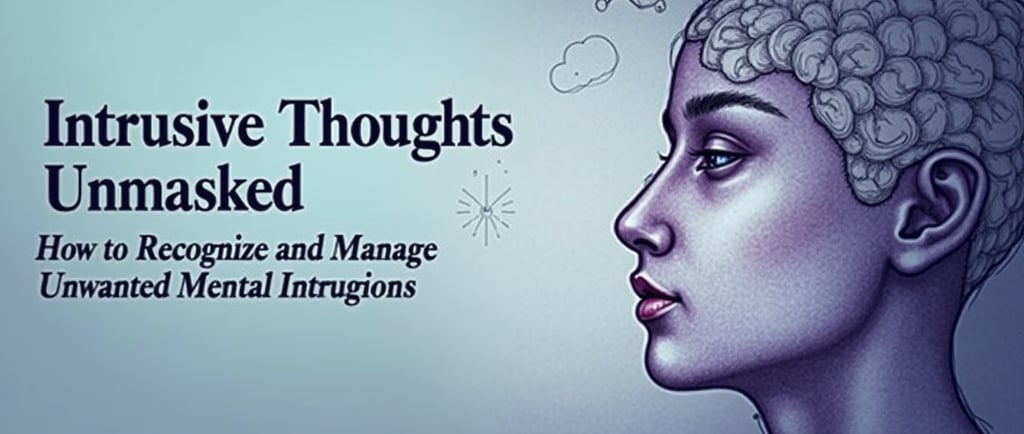Intrusive Thoughts Unmasked: How to Recognize and Manage Unwanted Mental Intrusions
THOUGHTS
3/11/20254 min read


Intrusive thoughts can be unsettling, appearing suddenly and often without any warning. These unwanted mental intrusions range from fleeting images and ideas to persistent, distressing narratives that can affect your daily life. While experiencing intrusive thoughts is a normal part of the human experience, when they become overwhelming, they can lead to anxiety, guilt, and self-doubt. In this post, we’ll explore what intrusive thoughts are, why they occur, and practical strategies to help you manage them effectively.
What Are Intrusive Thoughts?
Intrusive thoughts are involuntary and often unwanted ideas, images, or impulses that pop into your mind. They can be disturbing or distressing, especially when they involve themes that conflict with your values or beliefs. It’s important to understand that having these thoughts does not mean you endorse or want to act on them; rather, they are a natural byproduct of how our brains process information.
For many, intrusive thoughts may involve fears of harm, sexual content, or blasphemy. These thoughts can be particularly troubling when they repeatedly occur, leading to significant emotional distress. Recognizing that these thoughts are a common experience—often seen in conditions like obsessive-compulsive disorder (OCD) or generalized anxiety disorder (GAD)—is the first step toward addressing them.
Why Do Intrusive Thoughts Occur?
There isn’t a single answer to why intrusive thoughts appear. They can be triggered by stress, anxiety, or even by fatigue. Our brains are constantly processing and filtering information, and sometimes this process produces “mental noise” in the form of random, unwanted thoughts. Factors that may contribute include:
Anxiety and Stress: High levels of stress can make the brain more prone to generating negative thoughts.
Perfectionism: The pressure to be perfect can cause a heightened awareness of imperfections or mistakes, triggering intrusive thoughts.
Past Experiences: Traumatic or emotionally charged events can leave lasting imprints that resurface unexpectedly.
Cognitive Patterns: Habitual thought patterns, particularly those involving rumination or self-criticism, may also contribute to the frequency and intensity of intrusive thoughts.
Understanding that these thoughts are part of your brain’s natural functioning—not a reflection of your character—can help reduce the shame or guilt often associated with them.
Strategies for Managing Intrusive Thoughts
Managing intrusive thoughts involves a combination of cognitive techniques, mindfulness practices, and lifestyle adjustments. Here are some practical strategies that can help you regain control over your mental space:
1. Acknowledge Without Judgment
The first step in managing intrusive thoughts is to acknowledge their presence without attaching judgment. Instead of labeling the thoughts as “bad” or “wrong,” simply recognize them as mental events that come and go. Remind yourself that having these thoughts is normal and doesn’t define you.
Practice Observation: Treat your thoughts like passing clouds. Observe them without reacting emotionally, and allow them to dissipate on their own.
2. Challenge Cognitive Distortions
Often, intrusive thoughts are accompanied by irrational beliefs or exaggerated interpretations. Cognitive techniques can help you challenge these distortions.
Question the Evidence: When a distressing thought emerges, ask yourself, “What is the evidence that supports this thought?” Often, you’ll find that the fear is based on assumptions rather than facts.
Reframe the Narrative: Replace negative self-talk with more balanced statements. For instance, if you think, “I’m a terrible person for having these thoughts,” remind yourself that everyone experiences intrusive thoughts and that they do not determine your character.
3. Engage in Mindfulness Practices
Mindfulness meditation is a powerful tool for managing intrusive thoughts. By anchoring your attention in the present moment, you can reduce the intensity and frequency of these thoughts.
Mindful Breathing: Spend a few minutes each day focusing solely on your breath. This practice not only grounds you but also helps reduce overall anxiety.
Body Scan Meditation: Gradually shift your focus through different parts of your body, noting any sensations without judgment. This can help distract from intrusive thoughts and cultivate a sense of calm.
4. Use Thought-Stopping Techniques
When you notice an intrusive thought starting to spiral, use a thought-stopping technique. This method interrupts the cycle of rumination and gives you a moment to reset.
Visual or Verbal Cue: Imagine a stop sign or silently say “Stop” to yourself. This simple action can create enough of a break to shift your focus to something more constructive.
Redirect Your Focus: Immediately follow up with a positive activity—such as reading a few pages of a book, listening to calming music, or engaging in a hobby—to shift your mental energy.
5. Establish a Routine and Healthy Lifestyle
A stable routine and healthy lifestyle can significantly reduce the occurrence of intrusive thoughts. Taking care of your body helps create a resilient mind.
Regular Exercise: Engaging in physical activity helps reduce stress hormones and promotes the release of endorphins, natural mood boosters.
Balanced Diet: Nutrition plays a crucial role in brain health. A diet rich in fruits, vegetables, and lean proteins can support mental clarity.
Adequate Sleep: Consistent, quality sleep is essential for emotional regulation. Establish a calming bedtime routine to improve sleep quality.
Seeking Professional Support
If intrusive thoughts become too overwhelming or begin to interfere with your daily functioning, it may be time to seek professional help. Therapies such as Cognitive Behavioral Therapy (CBT) have been shown to be particularly effective in managing intrusive thoughts and associated anxiety. A mental health professional can work with you to develop personalized strategies that address the root causes of these thoughts.
Final Thoughts
Intrusive thoughts can be disruptive, but they are not insurmountable. By acknowledging these thoughts without judgment, challenging cognitive distortions, practicing mindfulness, and making healthy lifestyle choices, you can significantly reduce their impact on your life. Remember, the goal isn’t to eliminate every unwanted thought—an impossible task—but rather to learn to navigate them with greater ease and less distress.
Every small step you take toward managing intrusive thoughts is a victory in reclaiming your mental space. With time, patience, and the right strategies, you can transform these challenges into opportunities for personal growth and resilience. If you need further guidance or personalized support, don't hesitate to reach out to Steve—he’s here to help you navigate your journey toward mental clarity and lasting peace.
